不规则动词表 形容词 副词比较级最高级不规则变化表
- 格式:doc
- 大小:120.00 KB
- 文档页数:4

英语比较级和最高级的变化规则英语中,比较级和最高级是用来表示两个或多个事物之间的比较的形式。
比较级是用来表示两个事物之间的比较,而最高级则是用来表示三个或以上的事物之间的比较。
在英语中,比较级和最高级的变化规则是一种非常重要的语法知识点,因为它们在英语中的使用非常广泛。
本文将介绍英语比较级和最高级的变化规则。
一、形容词和副词的比较级和最高级形容词和副词的比较级和最高级的变化规则如下:1. 单音节和少数双音节形容词和副词的比较级和最高级变化规则:比较级:在形容词和副词的词尾加-er,如:tall(高)→ taller (更高),fast(快)→ faster(更快)。
最高级:在形容词和副词的词尾加-est,如:tall → tallest (最高的),fast → fastest(最快的)。
2. 双音节或多音节形容词和副词的比较级和最高级变化规则:比较级:在形容词和副词前加more,如:beautiful(美丽的)→ more beautiful(更美丽的),carefully(小心的)→ more carefully(更小心的)。
最高级:在形容词和副词前加most,如:beautiful → most beautiful(最美丽的),carefully → most carefully(最小心的)。
3. 不规则形容词和副词的比较级和最高级变化规则:比较级:不规则形容词和副词的比较级和最高级变化规则是不规则的,需要记忆。
如:good(好的)→ better(更好的),well(好地)→ better(更好的),bad(坏的)→ worse(更坏的)。
最高级:不规则形容词和副词的最高级变化规则也是不规则的,需要记忆。
如:good → best(最好的),well → best(最好的),bad → worst(最坏的)。
二、名词的比较级和最高级名词的比较级和最高级的变化规则如下:1. 单数名词的比较级和最高级变化规则:比较级:在名词前加more,如:car(车)→ more cars(更多的车)。

形容词和副词的比较级和最高级一.形容词和副词的比较级和最高级的变化方法如下(1) 符合规则的:(2)几个不规则的形容词和副词的比较级和最高级如下表:一分为二有两个,一是远来一是老。
合二为一共三对,坏病两多并两好。
还有一词双意含,只译少来不译小。
二.形容词和副词比较级的用法注意:有些形容词,如 dead, empty, round, sure, woolen 等受本身含义的限制,没有比较级。
例题解析1. He is ________ friends than I.A. much moreB. many moreC. very moreD. too more2. Which is the _________ country, Japan or Australia?A. more developedB. more developingC. most developedD. most developing3. There were _______ shops in the city in 1982 than in 1990.A. littleB. fewC. fewerD. less4. He can't tell us ________, I think.A. important anythingB. anything importantC. important somethingD. something important.5. The Huang River is the second __________ river in our country.A. longB. longerC. longestD. the longest6. The light in the office wasn't ________for him to read.A. enough brightB. bright enoughC. brightlyD. enough brightly三.形容词副词比较级最高级的其他用法(1)和冠词连用the +形容词原级+v(复),指一类人或物the +形容词比较级,指两者中“较…的”的那一个,eg. the younger of the twoa/ an +形容词比较级eg. The pen is expensive. I want a cheaper one.( a) +most+形容词最高级“非常…”eg. a most beautiful city( 2 ) 相关结构1)原级比较:肯定句as….as…., 否定句not so / as….as…..2)比较句:比较级+than….或more (less) ….than…..The furniture in this shop is less beautiful than that in that shop.(注意代词that的用法)3)比较级+and+比较级或more and more+比较级“越来越… ”richer and richer, more and more interesting4)The more….., the more…..“越…,越…”The more you look at the picture, the better you will like it.5) 比较级+than any other +n. (单)(适用于范围一致时)(all) other +n.(复)any +n.(单) (适用于范围不一致时)He is taller than any other student / all other students in his class.any student in my class.6) 倍数表达法。
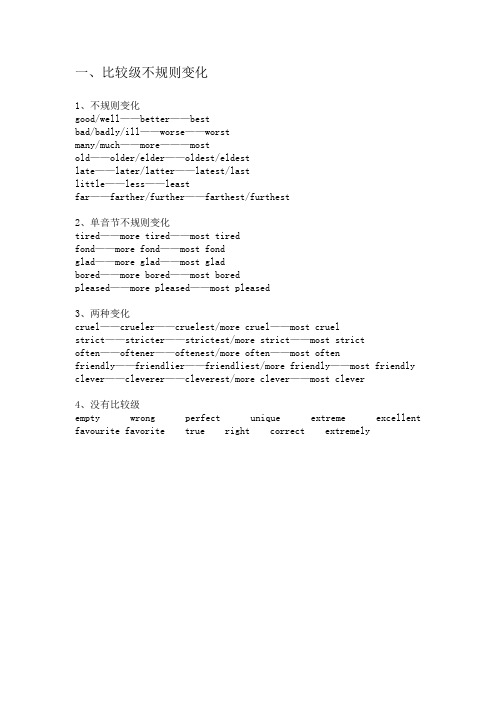
一、比较级不规则变化1、不规则变化good/well——better——bestbad/badly/ill——worse——worstmany/much——more———mostold——older/elder——oldest/eldestlate——later/latter——latest/lastlittle——less——leastfar——farther/further——farthest/furthest2、单音节不规则变化tired——more tired——most tiredfond——more fond——most fondglad——more glad——most gladbored——more bored——most boredpleased——more pleased——most pleased3、两种变化cruel——crueler——cruelest/more cruel——most cruel strict——stricter——strictest/more strict——most strict often——oftener——oftenest/more often——most often friendly——friendlier——friendliest/more friendly——most friendly clever——cleverer——cleverest/more clever——most clever4、没有比较级empty wrong perfect unique extreme excellent favourite favorite true right correct extremely二、过去式不规则变化1、A A A型(动词原形、过去式、过去分词同形)cost(花费)——cost——costcut(割)——cut——cuthit(打)——hit——hithurt (伤害)——hurt——hurtlet(让)——let——letput(放)——put——putread (读)——read——readset(安置)——set——setshut(关闭)——shut——shutbroadcast(广播)——broadcast——broadcastburst(爆发)——burst——burstsplit(切开)——split——split2、AAB型(动词原形与过去式同形)beat(跳动)——beat——beaten3、ABA型(动词原形与过去分词同形)become(变成)——became——becomecome(来)——came——comerun(跑)——ran——run overcome——overcame——overcome4、 ABB型(过去式与过去分词同形)bend(使弯曲)——bentdig(挖)——dug——dugget(得到)——got——gothang(吊死)—— hanged——hangedhang(悬挂)——hung——hunghold(抓住)——held——heldshine(照耀)——shone——shonesit(坐)——sat——satwin(赢)——won——wonmeet(遇见)——met——met keep(保持)——kept——keptsleep(睡)——slept——slept sweep(扫)——swept——sweptfeel(感觉)——felt——felt smell(闻)——smelt——smeltleave(离开)——left——leftbuild(建设)——built——builtlend(借出)——lent——lent send (传送)——sent——sentspend(花费)——spent——spentlose(丢失)——lost——lostburn (燃烧)——burnt——burnt learn(学习)——learnt ——learntmean(意思是)——meant——meantcatch(抓住)——caught——caughtteach(教)——taught——taughtbring(带来)——broughtbroughtfight (战斗)——fought——foughtbuy(买)——bought——boughtthink(想)——thought——thoughthear (听见)——heard——heardsell(卖)——sold——soldtell(告诉)——told——toldsay(说)——said——saidfind(找到)——found——foundhave/has(有)——had——hadmake(制造)——made——madestand(站)——stood——stood understand(明白)——understood——understood5、ABC型(动词原形、过去式与过去分词三者不同形)begin(开始)——began——begundrink(喝)——drank——drunkring(铃响)——rang——rungsing (唱) sang sungswim(游泳) swam swum blow(吹) blew blowndraw(画) drew drawnfly(飞) flew flowngrow(生长) grew grownknow(知道) knew knownthrow(投掷) threw thrown show(出示) showed shownbreak(打破) broke broken choose(选择) chose chosenforget(忘记) forgot forgotten speak(说,讲) spoke spokenwake(醒) woke woken drive(驾驶) drove driveneat(吃) ate eatenfall(落下) fell fallengive(给) gave givenrise(升高) rose risentake(取) took takenmistake(弄错) mistook mistakenride(骑) rode riddenwrite(写) wrote writtendo(做) did donego(去) went gonelie(平躺) lay lain lie(说谎) lied liedsee(看见) saw seenwear(穿) wore wornam/is(是) was been are(是) were been。

形容词/副词比较级最高级变化形式及用法1 、一般情况下,单音节或双音节的形容词(或副词)比较级+er ,最高级+est clever-cleverer-cleverest few-fewer-fewest small-smaller-smallest young-younger-youngest tall-taller-tallest long-longer longestshort-shorter-shortest strong-stronger-strongest warm-warmer-warmest slow-slower-slowest old-older-oldest high-higher-highest light-lighter-lightest fast-faster-fastest great—greater—greatest cool-cooler-coolest clean-cleaner-cleanest cheap-cheaper-cheapest quick-quicker-quickest2、以不发音e结尾的单音节词,比较在原级后加-r,最高级在原级后加-st;nice-nicer-nicest late-later-latest able-abler-ablestbrave-braver-bravestcute-cuter-cutest large-larger-largest close-closer-closest(亲密的)fine-finer-finest white-whiter-whitest free- freer-freest(免费的)3、以“辅音字母+y”结尾的双音节词,把y改为i,比较级加-er,最高级加-est;easy-easier-easiest happy-happier-happiest early-earlier-earliest busy-busier-busiest heavy-heavier-heaviest dirty-dirtier-dirtiestlazy-lazier-laziest dry-drier-driest pretty-prettier-prettiest funny-funnier-funniest healthy-healthier-healthiest4、在重读闭音节(即:辅音+元音+辅音)中,先双写末尾的辅音字母,比较级加-er,最高级加-est;fat-fatter-fattest thin-thinner-thinnest hot-hotter-hottestfit-fitter-fittest(合适的) red-redder-reddest wet-wetter-wettestbig-bigger-biggest sad-sadder-saddest5、其他双音节词和多音节词,比较级在前面加more,最高级在前面加most;beautiful -more beautiful - most beautifulcareful-more careful-most carefulintelligent-more intelligent-most intelligentexpensive delicious(美味的) popular(流行的) important(重要的)interesting(有趣的) afraid(害怕)quickly(迅速地的) quietly (安静地)6、少数单音节词也是这样;pleased-more pleased -most pleasedtired-more tried -most tired7、少数不规则形容词、副词的比较级和最高级,必须熟记。

不规则动词及比较级-最高级的不规则变化(总4页)-本页仅作为预览文档封面,使用时请删除本页-一、比较级不规则变化1、不规则变化good/well——better——bestbad/badly/ill——worse——worstmany/much——more———mostold——older/elder——oldest/eldestlate——later/latter——latest/lastlittle——less——leastfar——farther/further——farthest/furthest2、单音节不规则变化tired——more tired——most tiredfond——more fond——most fondglad——more glad——most gladbored——more bored——most boredpleased——more pleased——most pleased3、两种变化cruel——crueler——cruelest/more cruel——most cruel strict——stricter——strictest/more strict——most strict often——oftener——oftenest/more often——most often friendly——friendlier——friendliest/more friendly——most friendly clever——cleverer——cleverest/more clever——most clever4、没有比较级empty wrong perfect unique extreme excellent favourite favorite true right correct extremely二、过去式不规则变化1、A A A型(动词原形、过去式、过去分词同形)cost(花费)——cost——costcut(割)——cut——cuthit(打)——hit——hithurt (伤害)——hurt——hurtlet(让)——let——letput(放)——put——putread (读)——read——readset(安置)——set——setshut(关闭)——shut——shutbroadcast(广播)——broadcast——broadcast burst(爆发)——burst——burstsplit(切开)——split——split2、AAB型(动词原形与过去式同形)beat(跳动)——beat——beaten3、ABA型(动词原形与过去分词同形)become(变成)——became——becomecome(来)——came——comerun(跑)——ran——run overcome——overcame——overcome4、 ABB型(过去式与过去分词同形)bend(使弯曲)——bentdig(挖)——dug——dugget(得到)——got——gothang(吊死)—— hanged——hangedhang(悬挂)——hung——hunghold(抓住)——held——heldshine(照耀)——shone——shonesit(坐)——sat——satwin(赢)——won——wonmeet(遇见)——met——metkeep(保持)——kept——keptsleep(睡)——slept——sleptsweep(扫)——swept——sweptfeel(感觉)——felt——feltsmell(闻)——smelt——smeltleave(离开)——left——leftbuild(建设)——built——builtlend(借出)——lent——lentsend (传送)——sent——sentspend(花费)——spent——spentlose(丢失)——lost——lostburn (燃烧)——burnt——burntlearn(学习)——learnt ——learntmean(意思是)——meant——meantcatch(抓住)——caught——caughtteach(教)——taught——taughtbring(带来)——broughtbroughtfight (战斗)——fought——foughtbuy(买)——bought——boughtthink(想)——thought——thoughthear (听见)——heard——heardsell(卖)——sold——soldtell(告诉)——told——toldsay(说)——said——saidfind(找到)——found——foundhave/has(有)——had——hadmake(制造)——made——madestand(站)——stood——stood understand(明白)——understood——understood5、ABC型(动词原形、过去式与过去分词三者不同形)begin(开始)——began——begundrink(喝)——drank——drunkring(铃响)——rang——rungsing (唱) sang sungswim(游泳) swam swumblow(吹) blew blowndraw(画) drew drawnfly(飞) flew flowngrow(生长) grew grownknow(知道) knew knownthrow(投掷) threw thrownshow(出示) showed shownbreak(打破) broke brokenchoose(选择) chose chosenforget(忘记) forgot forgottenspeak(说,讲) spoke spokenwake(醒) woke wokendrive(驾驶) drove driveneat(吃) ate eatenfall(落下) fell fallengive(给) gave given rise(升高) rose risentake(取) took taken mistake(弄错) mistook mistaken ride(骑) rode ridden write(写) wrote writtendo(做) did done go(去) went gonelie(平躺) lay lain lie(说谎) lied liedsee(看见) saw seen wear(穿) wore wornam/is(是) was been are(是) were been。

形容词和副词的比较级和最高级一.形容词和副词的比较级和最高级的变化方法如下(1) 符合规则的:(2)几个不规则的形容词和副词的比较级和最高级如下表:二.形容词和副词比较级的用法注意:有些形容词,如 dead, empty, round, sure, woolen 等受本身含义的限制,没有比较级。
例题解析1. He is ________ friends than I.A. much moreB. many moreC. very moreD. too more2. Which is the _________ country, Japan or Australia?A. more developedB. more developingC. most developedD. most developing3. There were _______ shops in the city in 1982 than in 1990.A. littleB. fewC. fewerD. less4. If you are not free today, come another day __________.A. tooB. soC. insteadD. yet5.He can't tell us ________, I think.A. important anythingB. anything importantC. important somethingD. something important.6. The Huang River is the second __________ river in our country.A. longB. longerC. longestD. the longest7. The light in the office wasn't ________for him to read.A. enough brightB. bright enoughC. brightlyD. enough brightly.8. There was an accident at the corner. ________, the girl wasn't _________hurt.A. luckily, badlyB. luck, hardlyC. Lucky, heavilyD. Lucky, strongly9. Five days has passed , but I haven't finished half of the work________,A. alreadyB. stillC. tooD. yet三.形容词副词比较级最高级的其他用法(1)和冠词连用the +形容词原级+v(复),指一类人或物the +形容词比较级,指两者中“较…的”的那一个,eg. the younger of the twoa/ an +形容词比较级eg. The pen is expensive. I want a cheaper one.( a) +most+形容词最高级“非常…”eg. a most beautiful city( 2 ) 相关结构1)原级比较:肯定句as….as…., 否定句not so / as….as…..2)比较句:比较级+than….或more (less) ….than…..The furniture in this shop is less beautiful than that in that shop.(注意代词that的用法)3)比较级+and+比较级或more and more+比较级“越来越… ”richer and richer, more and more interesting4)The more….., the more…..“越…,越…”The more you look at the picture, the better you will like it.5) 比较级+than any other +n. (单)(适用于范围一致时)(all) other +n.(复)any +n.(单) (适用于范围不一致时)He is taller than any other student / all other students in his class.any student in my class.6) 倍数表达法。
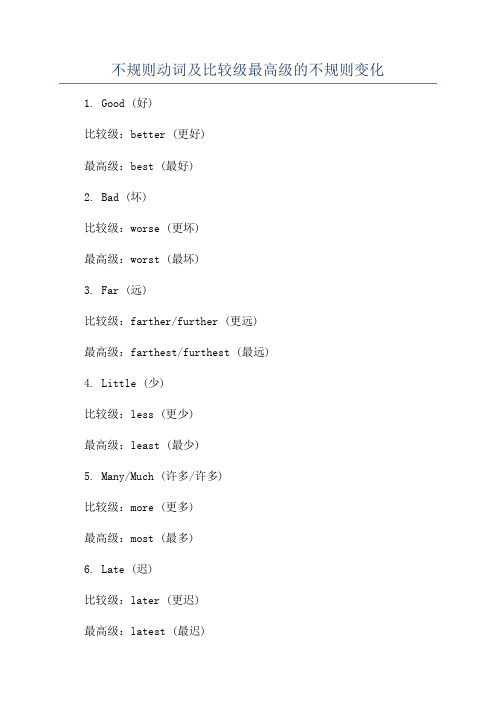
不规则动词及比较级最高级的不规则变化1. Good (好)
比较级:better (更好)
最高级:best (最好)
2. Bad (坏)
比较级:worse (更坏)
最高级:worst (最坏)
3. Far (远)
比较级:farther/further (更远)
最高级:farthest/furthest (最远)
4. Little (少)
比较级:less (更少)
最高级:least (最少)
5. Many/Much (许多/许多)
比较级:more (更多)
最高级:most (最多)
6. Late (迟)
比较级:later (更迟)
最高级:latest (最迟)
7. Old (老)
比较级:older/elder (年长的)
最高级:oldest/elder (最年长的)
8. Little (小)
比较级:lesser (更小)
最高级:least (最小)
9. Big (大)
比较级:bigger (更大)
最高级:biggest (最大)
10. High (高)
比较级:higher (更高)
最高级:highest (最高)
请注意,这只是一些常用的不规则动词的比较级和最高级形式。
其他不规则动词的变形可能会有所不同。
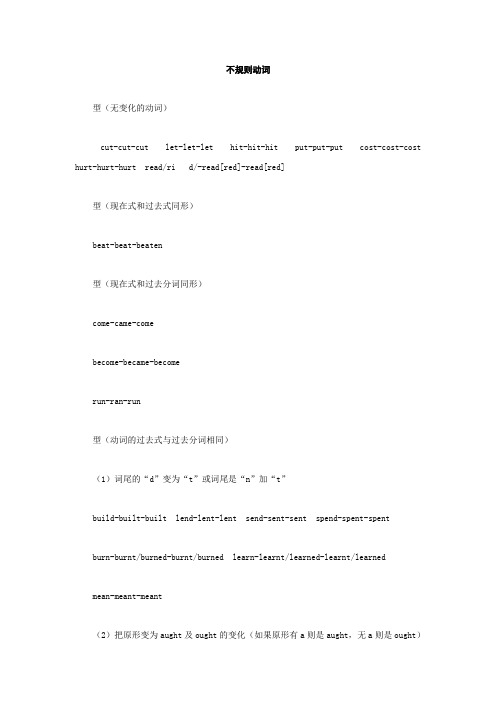
不规则动词型(无变化的动词)cut-cut-cut let-let-let hit-hit-hit put-put-put cost-cost-cost hurt-hurt-hurt read/ri d/-read[red]-read[red]型(现在式和过去式同形)beat-beat-beaten型(现在式和过去分词同形)come-came-comebecome-became-becomerun-ran-run型(动词的过去式与过去分词相同)(1)词尾的“d”变为“t”或词尾是“n”加“t”build-built-built lend-lent-lent send-sent-sent spend-spent-spentburn-burnt/burned-burnt/burned learn-learnt/learned-learnt/learnedmean-meant-meant(2)把原形变为aught及ought的变化(如果原形有a则是aught,无a则是ought)buy-bought-bought bring-brought-brought think-thought-thoughtfight-fought-fought catch-caught-caught teach-taught-taught(3)eep变ept或过去式、过去分词含有/e/音的动词keep-kept-kept sleep-slept-slept sweep-swept-swept leave-left-leftsay-said-said meet-met-met spell-spelt-speltsmell-smelt/smelled-smelt/smelled hold-held-held feel-felt-felt(4)其他dig-dug-dug find-found-found stand-stood-stoodunderstand-understood-understood get-got-got sit-sat-satspoil-spoilt-spoilt have/has-had-had sell-sold-sold tell-told-told hang-hanged/hung-hanged/hung hear-heard-heard make-made-madepay-paid-paid lay-laid-laid lie(说谎)-lied-lied lose-lost-lostshine-shone/shined-shone/shined win-won-won shoot-shot-shot型(现在式、过去式和过去分词都不相同)(1)in、im的变化(i-a-u型)sing-sang-sung ring-rang-rung begin-began-begundrink-drank-drunk swim-swam-swum sink-sank-sunk(2)在动词原形后加-n或-en构成过去分词①ow及aw的变化(过去式以ew结尾,过去分词以wn结尾)draw-drew-drawn know-knew-known throw-threw-thrownblow-blew-blown grow-grew-grown fly-flew-flown②元音是i的开音节的变化(过去分词以en结尾)drive-drove-driven rise-rose-risen ride-rode-riddenwrite-wrote-written give-gave-given③其他see-saw-seen eat-ate-eaten take-took-taken fall-fell-fallen freeze-froze-frozen show-showed-shown break-broke-brokenspeak-spoke-spoken wake-woke-woken choose-chose-chosenforget-forgot-forgotten lie(躺,放)-lay-lain wear-wore-wornbe(am,is,are)-was/were-been(3)其他go-went-gone do-did-done6.有过去式,没有过去分词的动词can-could may-might must-must shall-should will-would不规则名词复数形式1.以-f或-fe结尾的名词变复数(1)加-s,如:belief-beliefs roof-roofs gulf-gulfs(2)去f,fe加-ves,如:half-halves knife-knives leaf-leaves life-lives wolf-wolvesthief-thieves self-selves wife-wives shelf-shelves歌诀记忆:树叶(leaf)半数(half)自己(self)黄;妻子(wife)拿刀(knife)去割粮;架(shelf)后窜出一匹狼(wolf);就像小偷(thief)逃命(life)亡。
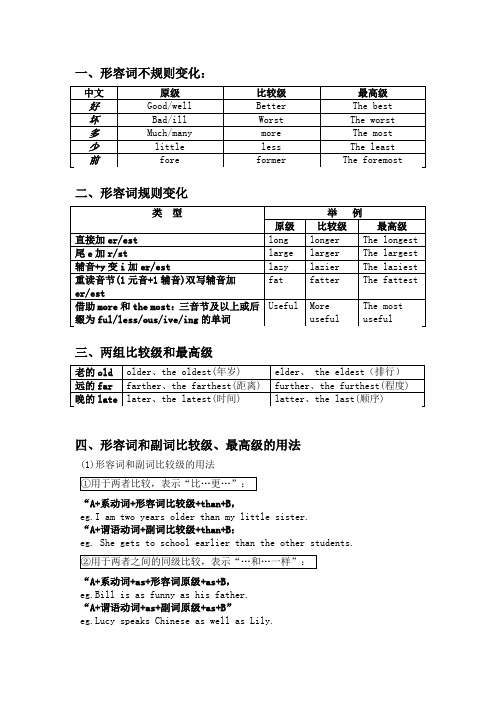
今天的天气比昨天暖和。
This picture is more beautiful than that one.这张照片比那张照片漂亮。
This meeting is less important than that one.这次会议不如那次会议重要。
The sun is much bigger than the moon.太阳比月亮大得多。
形容词最高级的用法:形容词最高级用于两个以上的人和物进行比较, 其结构形式为:主语+谓语(系动词)+the+形容词最高级+名词+表示范围的短语或从句。
She is the best student in her class.她是班上最好的学生。
Shanghai is one of the biggest cities in China.上海是中国最大城市之一。
This is the biggest apple I have ever met.这是我见到的最大的苹果。
Tom is the tallest boy in his basketball team.汤姆是他们篮球队中个子最高的孩子。
几个特殊用法:most 同形容词连用而不用 the,表示 "极,很,非常, 十分"。
It's most dangerous to be here.在这儿太危险。
I cannot do it, it's most difficult.我干不了这件事,太难了。
"The+形容词比较级..., the+形容词比较级..."表示 " 越... 就越..."。
The more you study, the more you know.你学的越多, 就知道的越多。
The more I have, the more I want.我越有就越想要有。
The more, the better.越多越好。
" 形容词比较级 + and + 形容词比较级 ", 表示 " 越来越... "。
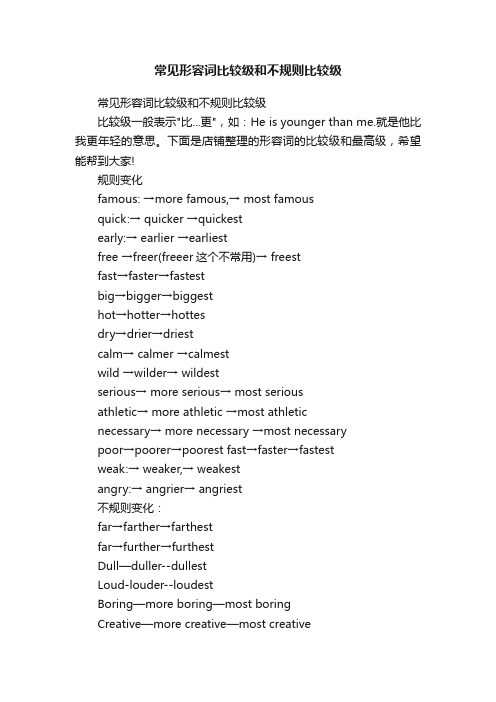
常见形容词比较级和不规则比较级常见形容词比较级和不规则比较级比较级一般表示"比...更",如:He is younger than me.就是他比我更年轻的意思。
下面是店铺整理的形容词的比较级和最高级,希望能帮到大家!规则变化famous: →more famous,→ most famousquick:→ quicker →quickestearly:→earlier →earliestfree →freer(freeer这个不常用)→ freestfast→faster→fastestbig→bigger→biggesthot→hotter→hottesdry→drier→driestcalm→ calmer →calmestwild →wilder→ wildestserious→ more serious→ most seriousathletic→ more athletic →most athleticnecessary→ more necessary →most necessarypoor→poorer→poorest fast→faster→fastestweak:→ weaker,→ weakestangry:→ angrier→ angriest不规则变化:far→farther→farthestfar→further→furthestDull—duller--dullestLoud-louder--loudestBoring—more boring—most boringCreative—more creative—most creativeWarm---warmer--warmestExpensive—more expensive—most expensivehigh,higher,highest large,larger,largestwet, wetter,wettest busy,busier,busiestdelicious,more delicious,most deliciousheavy,heavier,heaviestdry,drier,driesteasy easier easiestlazy lazier laziestpretty prettier prettiestnaughty naughtier naughtiestmealy mealier mealiestearly earlier earliestthirsty thirstier thirstiestgood / well→better→bestbad / ill→worse→worstmany / much→more→mostlittle→less→leastlate→later→ / latestlate→latter→last形容词和副词的比较级口诀及用法英语语法顺口溜:形容词和副词的比较级口诀一者比较用原级。


形容词和副词的比较级和最高级一. 形容词和副词的比较级和最高级的变化方法如下:(1) 规则变化表:(2)几个不规则的形容词和副词的比较级和最高级如下表:二.形容词和副词比较级的基本用法三.形容词副词比较级最高级的特殊用法(1)和冠词连用the +形容词原级+v(复),指一类人或物the +形容词比较级,指两者中―较…的‖的那一个,eg. the younger of the twoa/ an +形容词比较级eg. The pen is expensive. I want a cheaper one.a+most不是最高级相当于very,修饰其后的名词―非常…‖eg. a most beautiful city the+most表示最高级the most wonderful movie(2)序数词与最高级连用,如:Flying is the fastest and the second cheapest way to travel.(3)比较级+than any other +n. (单)(适用于范围一致时)(all) other +n.(复)any +n.(单) (适用于范围不一致时)any other student / all other students in his class.他是他们班最高any student in my class.他比我们班上任何一个同学都高。
(4)倍数表达法。
1. 倍数+ as + 形容词或副词的原级+ as + 其他。
这种结构又常演变成下列两类:①倍数+ as + many + 可数名词复数+ as;②倍数+ as +much + 不可数名词+ as。
如:There are seven times as many people as I expected.是我预料的人数的七倍。
There is five times as much coffee in this glass as in that one.这个杯子里的咖啡是那个杯子里的五倍。

不规则动词表现在式过去式过去分词am, is was beenare were beenbabysit babysat babysatbear bore bornebecome became becomebend bent bentbegin began begunbite bit bittenbleed bled bledblow blew blownbreak broke brokenbring brought broughtbuild built builtburn burnt burntburn burned burnedbuy bought boughtcan could -catch caught caughtchoose chose chosencome came comecost cost costcreep crept creptcut cut cutdig dug dugdo, does did donedraw drew drawndrink drank drunkdrive drove driveneat ate eatenfall fell fallenfeed fed fedfeel felt feltfight fought foughtfind found foundfly flew flownborbid forbade forbiddenforget forgot forgottenfreeze froze frozenforgive forgave forgivenget got gotgive gave givengo went gonegrow grew grownhas, have had hadhang hung hunghang hanged hangedhear heard heardhide hid hiddenhit hit hithold held heldhurt hurt hurtkeep kept keptknow knew known 现在式过去式过去分词lay laid laid leap leapt leapt leap leaped leaped learn learnt learnt learn learned learned leave left leftlend lent lentlet let letlie lay lain light lit litlight lighted lighted lose lost lost make made made may might -mean meant meant meet met metpay paid paidput put put read read read retell retold retold ride rode ridden ring rang rung rise rose risen run ran runsay said saidsee saw seen seek sought sought sell sold sold send sent sentset set set shake shook shaken shall should -shine shone shone shoot shot shotshow showed shown sing sang sungsit sat sat sleep slept slept smell smelt smelt smell smelled smelled spead sped sped speak spoke spoken spell spelt spelt spend spent spent spoil spoilt spoilt spread spread spread stand stood stood steal stole stolen stick stuck stuck sweep swept swept swim swam swum swing swung swung take took taken现在式过去式过去分词teach taught taught tear tore torntell told toldthink thought thought throw threw thrown treadtrod trod trodden understand understood understood upset upset upset wake woke woken wake waked waked wear wore worn will would -win won won wind wound wound write wrote written形容词&副词比较级,最高级不规则表原形比较级最高级good, well better bestill, bad, badly worse worstlittle less leastold older,elder oldest,eldestmany, much more mostfar farther farthest(表距离)further furthest(表程度)late later latest(用于时间)latter last(用于顺序)。

形容词和副词的比较级和最高级一、形容词的比较级和最高级: 形容词的比较级和最高级形式是在形容词的原级形式的基础上变化的。
分为规则变化和不规则变化。
1】规则变化如下:1)单音节形容词的比较级和最高级形式是在词尾加 -er 和 -est 构成。
Great2) 以 -e 结尾的单音节形容词的比较级和最高级是在词尾加 -r 和 -st 。
wide3)少数以-y, -er, -ow, -ble结尾的双音节形容词的比较级和最高级是在词尾加-er 和-est 构成。
Clever4)以 -y 结尾,但 -y 前是辅音字母的形容词的比较级和最高级是把 -y 去掉,加上-ier 和-est 构成. happy5) 以一个辅音字母结尾其前面的元音字母发短元音的形容词的比较级和最高级是双写该辅音字母然后再加-er和-est。
big6)双音节和多音节形容词的比较级和最高级需用more 和 most 加在形容词前面来构成。
beautiful difficult2】常用的不规则变化的形容词的比较级和最高级:原级------比较级------最高级good------better------bestmany------more------mostmuch------more------mostbad------worse------worstfar------farther, further------farthest, furthest形容词前如加 less 和 least 则表示"较不"和"最不"important 重要 less important 较不重要 least important 最不重要3】形容词比较级的用法:形容词的比较级用于两个人或事物的比较,其结构形式如下:主语+谓语(系动词)+ 形容词比较级+than+ 对比成分。
也就是, 含有形容词比较级的主句+than+从句。

一、不规则动词表:1.A-A-A型(无变化的动词)cut-cut-cut let-let-let hit-hit-hit put-put-put cost-cost-cost hurt-hurt-hurt read/[rid]/-read[red]-read[red]2.A-A-B型(现在式和过去式同形)如:beat-beat-beaten3.A-B-A型(现在式和过去分词同形)come-came-come become-became-become run-ran-run4.A-B-B型(动词的过去式与过去分词相同)1)词尾的“d”变为“t”或词尾是“n”加“t”build-built-built lend-lent-lent send-sent-sent spend-spent-spent burn-burnt/burned-burnt/burned learn-learnt/learned-learnt/learned mean-meant-meant2)把原形变为aught及ought的变化(如果原形有a则是aught,无a则是ought)buy-bought-bought bring-brought-brought think-thought-thoughtfight-fought-fought catch-caught-caught teach-taught-taught3)-eep变-ept或过去式、过去分词含有/e/音的动词keep-kept-kept sleep-slept-slept sweep-swept-swept leave-left-left say-said-said meet-met-met spell-spelt-speltsmell-smelt/smelled-smelt/smelled hold-held-held feel-felt-felt4)其他dig-dug-dug find-found-found stand-stood-stood understand-understood-understood get-got-got sit-sat-satspoil-spoilt-spoilt have/has-had-had sell-sold-sold tell-told-told hang-hanged/hung-hanged/hung hear-heard-heard make-made-madepay-paid-paid lay-laid-laid lie(说谎)-lied-lied lose-lost-lost shine-shone/shined-shone/shined win-won-won shoot-shot-shot5.A-B-C型(现在式、过去式和过去分词都不相同)1)in、im的变化(i-a-u型)sing-sang-sung ring-rang-rung begin-began-begundrink-drank-drunk swim-swam-swum sink-sank-sunk2)在动词原形后加-n或-en构成过去分词①ow及aw的变化(过去式以ew结尾,过去分词以wn结尾)draw-drew-drawn know-knew-known throw-threw-thrownblow-blew-blown grow-grew-grown fly-flew-flown②元音是i的开音节的变化(过去分词以en结尾)drive-drove-driven rise-rose-risen ride-rode-riddenwrite-wrote-written give-gave-given③其他see-saw-seen eat-ate-eaten take-took-taken fall-fell-fallenfreeze-froze-frozen show-showed-shown break-broke-brokenspeak-spoke-spoken wake-woke-woken choose-chose-chosenforget-forgot-forgotten lie(躺,放)-lay-lain wear-wore-worn be(am,is,are)-was/were-been(3)其他go-went-gone do-did-done6.有过去式,没有过去分词的动词can-could may-might must-must shall-should will-would二、不规则名词复数形式1.以-f或-fe结尾的名词变复数(1)加-s,如:belief-beliefs roof-roofs gulf-gulfs(2)去f,fe加-ves,如:half-halves knife-knives leaf-leaves life-lives wolf-wolvesthief-thieves self-selves wife-wives shelf-shelves歌诀记忆:树叶(leaf)半数(half)自己(self)黄;妻子(wife)拿刀(knife)去割粮;架(shelf)后窜出一匹狼(wolf);就像小偷(thief)逃命(life)亡。
![[整理]不规则动词及比较级,最高级的不规则变化](https://img.taocdn.com/s1/m/e879365b2a160b4e767f5acfa1c7aa00b52a9d6c.png)
一、比较级不规则变化1、不规则变化good/well——better——bestbad/badly/ill——worse——worstmany/much——more———mostold——older/elder——oldest/eldestlate——later/latter——latest/lastlittle——less——leastfar——farther/further——farthest/furthest2、单音节不规则变化tired——more tired——most tiredfond——more fond——most fondglad——more glad——most gladbored——more bored——most boredpleased——more pleased——most pleased3、两种变化cruel——crueler——cruelest/more cruel——most cruel strict——stricter——strictest/more strict——most strictoften——oftener——oftenest/more often——most often friendly——friendlier——friendliest/more friendly——most friendlyclever——cleverer——cleverest/more clever——most clever4、没有比较级empty wrong perfect unique extreme excellent favourite favorite true right correct extremely二、过去式不规则变化1、A A A型(动词原形、过去式、过去分词同形)cost(花费)——cost——costcut(割)——cut——cuthit(打)——hit——hithurt (伤害)——hurt——hurtlet(让)——let——letput(放)——put——putread (读)——read——readset(安置)——set——setshut(关闭)——shut——shutbroadcast(广播)——broadcast——broadcastburst(爆发)——burst——burstsplit(切开)——split——split2、AAB型(动词原形与过去式同形)beat(跳动)——beat——beaten3、ABA型(动词原形与过去分词同形)become(变成)——became——becomecome(来)——came——comerun(跑)——ran——run overcome——overcame——overcome4、 ABB型(过去式与过去分词同形)bend(使弯曲)——bentdig(挖)——dug——dugget(得到)——got——gothang(吊死)—— hanged——hangedhang(悬挂)——hung——hunghold(抓住)——held——heldshine(照耀)——shone——shonesit(坐)——sat——satwin(赢)——won——wonmeet(遇见)——met——met keep(保持)——kept——keptsleep(睡)——slept——sleptsweep(扫)——swept——sweptfeel(感觉)——felt——felt smell(闻)——smelt——smeltleave(离开)——left——left build(建设)——built——builtlend(借出)——lent——lent send (传送)——sent——sentspend(花费)——spent——spentlose(丢失)——lost——lostburn (燃烧)——burnt——burnt learn(学习)——learnt ——learntmean(意思是)——meant——meantcatch(抓住)——caught——caughtteach(教)——taught——taught bring(带来)——broughtbroughtfight (战斗)——fought——fought buy(买)——bought——boughtthink(想)——thought——thought hear (听见)——heard——heardsell(卖)——sold——soldtell(告诉)——told——toldsay(说)——said——saidfind(找到)——found——foundhave/has(有)——had——had make(制造)——made——madestand(站)——stood——stood understand(明白)——understood——understood5、ABC型(动词原形、过去式与过去分词三者不同形)begin(开始)——began——begundrink(喝)——drank——drunkring(铃响)——rang——rungsing (唱) sang sungswim(游泳) swam swum blow(吹) blew blowndraw(画) drew drawnfly(飞) flew flowngrow(生长) grew grownknow(知道) knew knownthrow(投掷) threw thrown show(出示) showed shownbreak(打破) broke broken choose(选择) chose chosenforget(忘记) forgot forgottenspeak(说,讲) spoke spokenwake(醒) woke wokendrive(驾驶) drove driveneat(吃) ate eatenfall(落下) fell fallengive(给) gave givenrise(升高) rose risentake(取) took takenmistake(弄错) mistook mistakenride(骑) rode riddenwrite(写) wrote writtendo(做) did donego(去) went gonelie(平躺) lay lainlie(说谎) lied liedsee(看见) saw seenwear(穿) wore wornam/is(是) was been are(是) were been。

形容词的比较级heavy-heavier-heaviest 沉重的ugly-uglier-ugliest 丑陋的pretty-prettier-prettiest 漂亮的hard-harder-hardest 努力的,困难的lively-livelier-liveliest 生动、活泼的healthy-healthier-healthiest 健康的wealthy-wealthier-wealthiest 富裕的rich-richer-richer富有的poor-poorer-poorer 贫穷的great-greater-greatest 好的,棒的few-fewer-fewest 少量的busy-busier-busiest 忙碌的happy-happier-happiest高兴的clear-clearer-clearest 清楚的,清晰的clean-cleaner-cleanest 干净的,清洁的cold-colder-coldest 冷的hot-hotter-hottest 热的thin-thinner-thinnest 瘦的,薄的large-larger-largest 大的big-bigger-biggest 大的clever-cleverer-cleverest 聪明的simple-simpler-simplest 简单的late-later-latest(最新的)晚的,迟的near-nearer-nearest 近的far-farther-farthest 远的old-older(elder)-oldest(eldest)wide-wider-widest 宽的long-longer-longest 长的tall-taller-tallest 高的high-higher-highest 高的low-lower-lowest 低的loud-louder-loudest 大声地easy-easier-easiest 容易的small-smaller-smallest 小的short-shorter-shortest 短的narrow-narrower-narrowest 窄的ill/bad-worse-worst 病的(坏的)sad-sadder-saddest 悲伤,难过的strong-stronger-strongest 强壮的,特殊的序数词:five→ fifth,twelve→twelfth,eight→eighth,nine→ninth,twenty→twentieth, thirty→thirtieth。